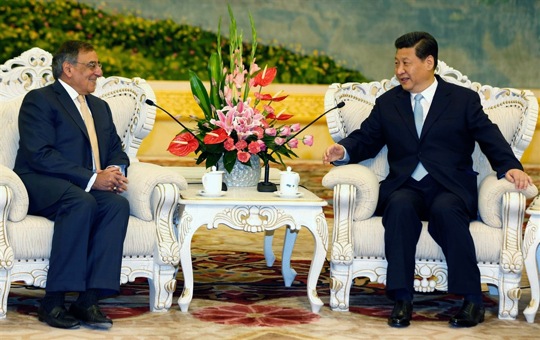
U.S. Defense Secretary Leon Panetta meets Xi Jinping at the Great Hall of the People, via NBC News (picture by Larry Downing / Reuters)
As nationalistic fervor cools across the country, here’s one last compilation of Diaoyu-, Mukden-, and Japan-related links.
Tuesday’s protest in Beijing: “Police equaled or outnumbered protesters, and they had been issued megaphones to whisk people along when they lingered. About halfway down the protest route, I heard the recorded voice of a woman, and initially thought it was a recording from the protesters. It took me a second to realize it was coming from the police station, and the message was not directed to the Japanese at all. In Chinese, it said: // ‘Since Japan has violated our national sovereignty, it is natural that we express our feelings. We share the same feeling with you. The government’s stance is clear: the government will not tolerate the violation of our national sovereignty. We should support our government, express our patriotic sentiments in a legal, orderly, and rational fashion. We should obey the laws and regulations, and not adopt extreme behavior, or disturb the social order. Please coördinate yourselves with our work, and obey the instructions of the police. Please do not linger here after you express yourself. Thank you everyone.’” [Evan Osnos, The New Yorker]
Channeling dissent, to an extent. “So now there are people who really do want to march, chant and throw plastic bottles at Japan’s embassy. And the authorities—either because they are afraid of angering people by denying them the opportunity or because they like the idea—are allowing it, up to a point. Since it would be riskier to let protesters march long distances across Beijing and pick up steam as they went, it makes a good deal of sense to provide the masses with buses. And since they are loth to pass up any opportunity to guide public opinion, they are probably also handing out flags and signs with approved messages.” [Analects]
Boycotting goods can backfire, namely in that one is unable to obtain those goods. “Yet despite China’s growing clout in international economics, the boycott/consumer action sword can cut both ways. Whilst Japan is the current target of action in the mainland and Hong Kong, companies from all nations are being made more aware of the particularities of political risk in China – and will also remember the recent experiences of Carrefour and MacDonald’s. Investment decisions are affected by risk, and a company’s costs are increased if insurance premiums rise. Even shutting down facilities for a week or two is damaging to a corporation.” [The Diplomat]
A Chinese student in Japan weighs in. “What do we make of the hundred thousand Okinawans confronting American military bases in large-scale demonstrations? // At our university, I have already come across quite a few Japanese students who have been to China. Once they know I’m from China, they all ‘show off’ and use Chinese to give a self-introduction, and then in stilted tones say China’s food is delicious, and so spicy! They do this in a very friendly way… // Saying this, I just want to remind my comrades: Beating up ordinary Japanese back in China just closes the last door to exchange among our people.” [Tea Leaf Nation]
Yes, our ability to be stupid is embedded in our DNA. “What is nationalism, after all, but tribalism writ large? We human beings, despite leaving the hunter-gatherer lifestyle and congregating into political entities with millions of others, have found it quite difficult to shed our old monkey ways.” [Stan Abrams, China Hearsay]
Well that’s one way of ensuring the safety of Japanese cars. “Cable from the Hunan Huaihua Municipal Party Committee: Japanese Cars Banned from Road September 17-19: The Huaihua Municipal Party Committee gives notice in the cable below that all brands of Japanese cars are barred from driving on the road from September 17 through 19.” [China Digital Times]
Shed a tear for poor tourism companies. “Travel companies say they are seeing slowing business between China and Japan as the two countries ratchet up the rhetoric in a territorial dispute over a group of East China Sea islands. That has led to occasionally violent protests in China with a definite anti-Japanese tone.” [WSJ]
Chinese stone flute interlude:
Finally…
Protest in Guangzhou. [The Nanfang]
Advocating nonviolent protest. [Antiviolence.zhiliao.cc]
Gary Locke’s car is damaged by protesters. [AP]
Half-imagining a US-China conflict. [The Diplomat]
“Thousands take to the streets to express nuanced views on complex issue.” [China Daily Show]
Finally, finally…

Sola Aoi again: “Diaoyu Islands belong to China,” via Global Times (story taken offline for whatever reason).

















































If you look up Mr Vitchek’s credentials, you will find that his career has been bought and sold on his criticisms of The West ( that wonderful monolithic entity) so he is PRECISELY the kind of talking head that China Daily would want to employ – international credentials, US citizen, will write to the party line.
I don’t believe in this case there has been any soul-selling. He truly believes this.
Whoops, posted in the wrong place…
Seems Global Times fell for a hoax — Sola Aoi was cheering on Li Na back in 2011.
I haven’t heard about any protests in Taiwan. Why just HK and China? Aren’t the Taiwanese pretty upset about this too?